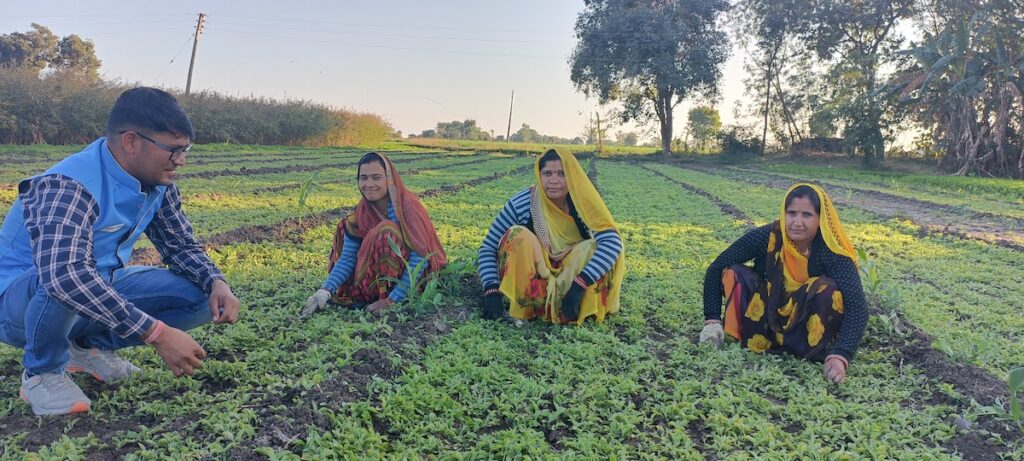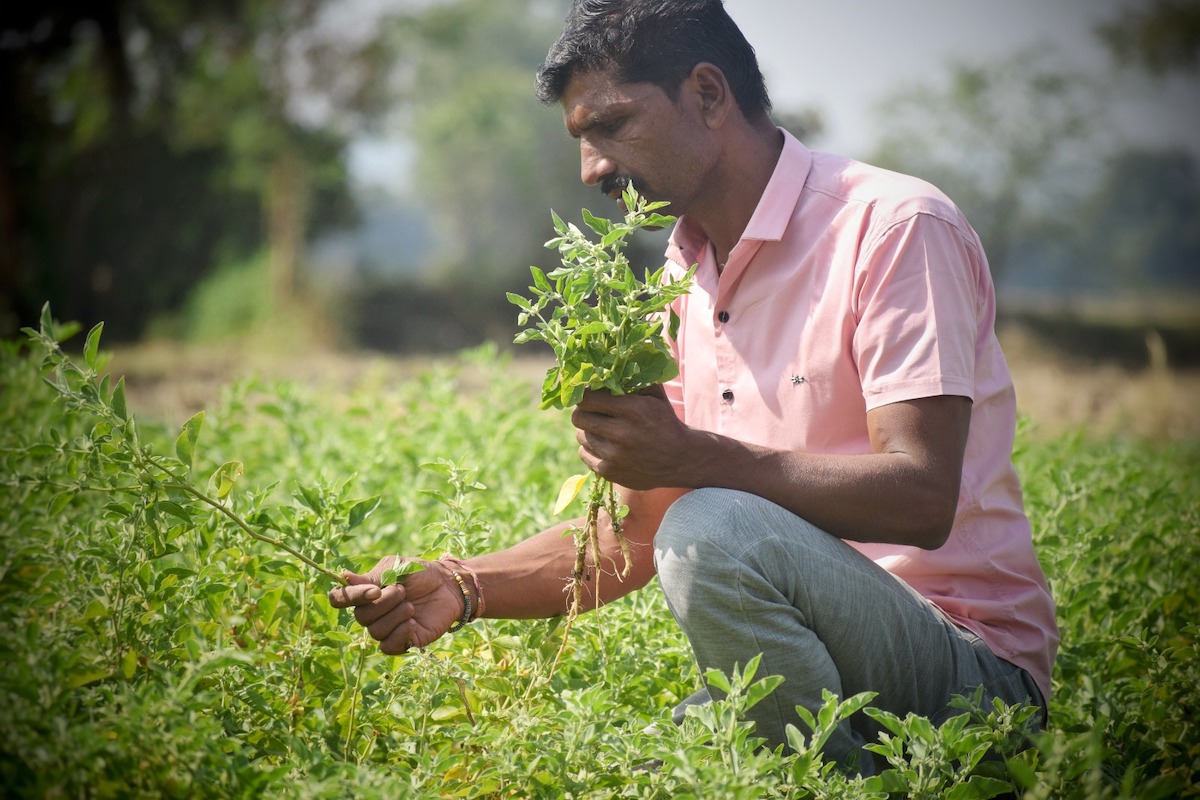Lakhan Pathak, leader of the Krishak Jagriti Manch, at his farm in India.
The Retam Farmer Producer Company Ltd. and Krishak Jagriti Manch Producer Group, have both received a certification from the Quality Council of India (QCI) under the Voluntary Certification Scheme for Medicinal Plant Produce (VCSMPP) of the National Medicinal Plants Board (NMPB). The NMPB, under the Ministry of Ayush, Government of India, promotes the cultivation, conservation, and sustainable use of medicinal plants in India.
Both Retam, a farmer producer company formed in February 2022 and currently with 395 members, and Krishak Jagriti Manch, a registered group of 40 farmers formed in December 2022, are based in the state of Madhya Pradesh. The two organizations produce ashwagandha (Withania somnifera), an evergreen medicinal plant commonly used to address stress.
“Securing certification from the Quality Council of India is a boon for us farmers, especially when dealing with medicinal products,” said Lakhan Pathak, a resourceful medicinal-plant farmer and the leader of the Krishak Jagriti Manch.
He goes on to say that, “Selling crops with healing properties is no easy feat, but this certification serves as our shield. It vouches for the purity and effectiveness of our produce, making it easier for customers to trust in the healing power of our harvest. It also unlocks the doors to the market.”
For individual farmers like Lakhan, these producer groups, supported by Solidaridad under the Sustainable Medicinal and Aromatic Plants (Sustainable MAPs) programme, provide greater access to larger and more diverse markets and supply chains. The project helps farmers avail themselves of government equity plans and subsidies which exist to support the medicinal plant sector, while enabling groups like Retam to procure agricultural inputs at lower prices.
Moreover, due to the increased exchange of knowledge, cultivators are able to diversify their products and stay up-to-date on the latest agricultural trends and innovative farming techniques to manage the risks associated with weather and market fluctuations. The interventions have led to increased prosperity among the farmers, with Retam achieving a turnover of ₹17.50 lakh (21,000 USD/19,091 EUR) since its inception.
MAPs have great potential to contribute significantly to India’s export earnings. This certification will boost our farmers’ confidence to improve medicinal plants’ cultivation. They will certainly get better market access for their products which will eventually support their livelihood.
Dr. Suresh Motwani, General Manager, Solidaridad
Certification as a journey
The Quality Council of India conducted a rigorous assessment of Retam and Krishak Jagriti Manch as part of the certification process. It involved a thorough assessment of agricultural parameters, including cultivation practices, harvesting methods, post-harvest handling, and storage practices. Additionally, the evaluation took into account compliance with environmental and ethical standards that are used to ensure the sustainable and responsible production of medicinal plants.

The certification not only validates both groups’ adherence to quality and sustainability standards, but it positions them as key players in the burgeoning market for medicinal and aromatic plants. It is an accomplishment that reflects their dedication to promoting health, environmental responsibility, and the sustainable growth of the medicinal plants sector. The certification process is based on criteria that include:
- Quality assurance: The voluntary certification demonstrates the dedication of the producer groups towards maintaining the highest-quality standards in cultivation and processing of MAPs.
- Environmental sustainability: The certification process evaluates the organizations’ adherence to environmentally sustainable practices and how responsible cultivation can contribute to the conservation of biodiversity and the protection of ecosystems.
- Market recognition: Certification from QCI enhances Retam’s and Krishak Jagriti Manch’s credibility in the market and among national and international consumers and buyers.
- Contribution to health and wellness: The certification aligns with a broader goal to promote the use of medicinal plants for health and wellness.
“We have often come across the challenge of enhancing the market value of our products. Since Mandsaur [a district in Madhya Pradesh] is the hub of medicinal plants and has a big market to procure farmers’ produce, it’s crucial to have such certification so that we can gain a significant space in the market,” said Dashrath Patidar, a farmer and Board member with Retam FPC.
He says that, “The QCI certification helps us acquire a better price for our products. Needless to say, our products now stand distinguished.”
Promoting sustainability in the medicinal plants sector
In Madhya Pradesh, Solidaridad’s Sustainable Medicinal and Aromatic Plants programme addresses the multi-faceted sustainability issues faced by the medicinal and herbal medicine sector. The programme introduces MAPs as crops that enhance the livelihood and income of smallholders, while encouraging farmers to practice regenerative agriculture. The crops cultivated under the programme include ashwagandha, mint, lemongrass, kalmegh (green chiretta), tulsi (basil), akarkara (Spanish chamomile), black cumin, isabgol (Psyllium husk) and turmeric.
The programme has ignited a spark of curiosity among the fellow farmers of my village. They now come to me to learn the techniques of cultivating medicinal plants.
Dinesh Patidar, a farmer from Rola village in Madhya Pradesh’s Sehore district, who successfully shifted from wheat and chickpea cultivation to ashwagandha cultivation.
Solidaridad’s support for certification
Currently, Solidaridad’s Sustainable MAPs project serves 1,000 medicinal and aromatic crop-growers in eight Indian districts. It also facilitates the implementation of the voluntary certification initiative. Additionally, Solidaridad is collaborating with the state’s Ayush department in the execution of the Devaranya Yojana (a social welfare plan that aims to increase employment opportunities in the tribal areas) within the eight participating districts.
The programme continues to promote sustainability in the MAP sector by adopting an integrated and market-based entrepreneurial approach. It provides interventions at four key levels:
Through this programme, not only have we improved the livelihoods of farmers by providing them with opportunities to earn a sustainable income, we have also witnessed the restoration of degraded lands and the preservation of biodiversity in the regions where we operate. Solidaridad is promoting MAPs as a part of regenerative farming systems.
Dr. Suresh Motwani, General Manager, Solidaridad
The Sustainable MAPs programme has been an instrumental support for farmer groups seeking QCI certification. Solidaridad’s project provides critical guidance, along with needed resources, to ensure that groups meet the stringent certification criteria set forth by the QCI. Solidaridad will continue to support farmer groups with quality seeds and capacity building efforts, while promoting sustainable agricultural practices. Moving forward, Solidaridad is ready to help Indian farmers break down market barriers and fully participate in the MAPs value chain.

